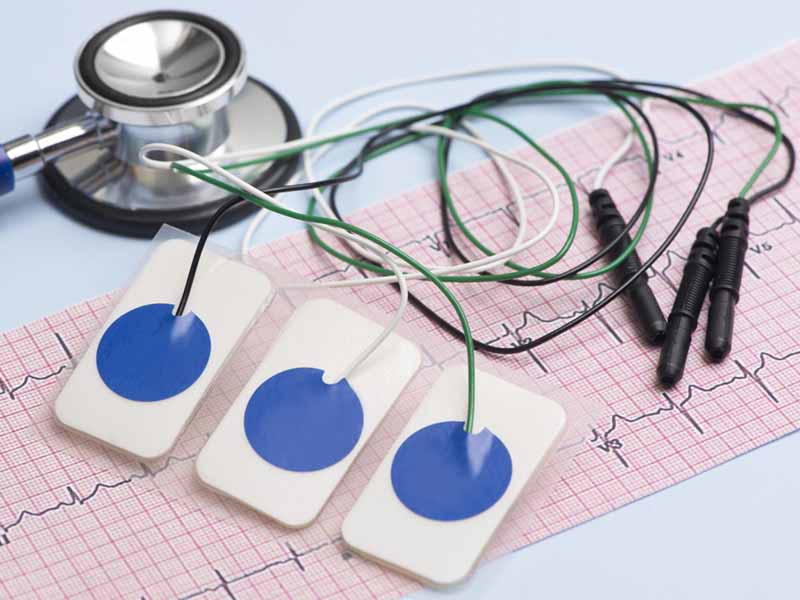USPSTF: Evidence Lacking on Screening for AFib With ECG
Final Statement Cites Inability to Assess Relative Benefits, Harms
August 15, 2018, 08:48 am News Staff – On Aug. 7, the U.S. Preventive Services Task Force (USPSTF) posted a final recommendation statement and final evidence report on screening for atrial fibrillation (AFib) with electrocardiography (ECG).
The USPSTF examined whether screening adults 65 and older who are asymptomatic for AFib using ECG is effective in helping physicians diagnose the condition earlier, thus preventing possible strokes.
Based on its review, the task force concluded that current evidence is insufficient to assess the balance of benefits and harms of screening for AFib with ECG -- an "I" recommendation.
"Atrial fibrillation is a major risk factor for stroke in adults 65 years and older and often is not detected until someone has a stroke," said USPSTF member Seth Landefeld, M.D., in a news release. "If (AFib) could be detected earlier, some of these strokes might be avoided. However, we found that more research is needed to determine whether the benefits outweigh the harms of screening for (AFib) with ECG."

Patients with persistent and permanent AFib have the highest risk of stroke, but even paroxysmal AFib, which accounts for about 25 percent of all AFib cases, increases stroke incidence.
"Clinicians should use their medical judgment on whether to screen for (AFib) in people 65 years and older with no signs or symptoms," said USPSTF member Michael Barry, M.D., in the release.
This final recommendation statement updates and is consistent with the task force's December 2017 draft recommendation. Notably, this is the first time the USPSTF has published a recommendation on screening for AFib with ECG.
The task force's systematic review evaluated evidence on the benefits and harms of screening for AFib with ECG in older adults, the effectiveness of ECG screening in detecting previously undiagnosed AFib compared with usual care (including prompted pulse palpation), and the benefits and harms of anticoagulant or antiplatelet therapy to treat screen-detected AFib in older adults.
Story Highlights
Response to Public Comment
A draft version of this recommendation statement was posted for public comment on the USPSTF website from Dec. 19, 2017, to Jan. 22, 2018.
In response to some commenters, the USPSTF clarified the intervention (screening with ECG) and comparison methods (usual care, including prompted pulse palpation) considered for this recommendation.
The task force also added information from a study titled "Assessment of Remote Heart Rhythm Sampling Using the AliveCor Heart Monitor to Screen for Atrial Fibrillation" to the "Discussion" section and added wording regarding the need to understand the stroke risk associated with brief episodes of AFib to the "Other Considerations" section.
Other commenters asked the USPSTF to not exclude studies involving patients with heart failure or those who had implantable cardiac devices. In response, the task force noted that it is charged with evaluating the benefits and harms of screening and clinical preventive services in generally healthy, asymptomatic people.
Finally, the USPSTF updated its "Recommendations of Others" section to include the guideline of the European Society of Cardiology, which recommends opportunistic screening by pulse palpation or an ECG rhythm strip in patients older than 65 and also recommends considering systematic screening to detect AFib in patients older than 75, as well as in those at high risk of stroke.
Up Next
The AAFP's Commission on Health of the Public and Science plans to review the USPSTF's final recommendation statement and evidence summary and determine the Academy's stance on the recommendation.
When the draft version of this recommendation was released, USPSTF member Alex Krist, M.D., M.P.H., said in a news release that more research was needed to determine whether screening for AFib with ECG can help prevent strokes, adding that "trials in people without signs or symptoms of AFib that compare screening with ECG to usual care will help fill this research gap."
The ongoing STROKESTOP study in Sweden is considered to be one such trial. The study has randomized 28,768 adults ages 75-76 to being invited or not invited for screening -- first with 12-lead ECG and then intermittently with a handheld single-lead ECG device for two weeks. The primary outcome is stroke incidence, and results are anticipated in 2019.
Related AAFP News Coverage
USPSTF: Don't Use ECG to Screen Low-risk Adults for CVD Events
Evidence Lacking to Assess Harms, Benefits of Screening Those at Intermediate, High Risk
(6/14/2018)